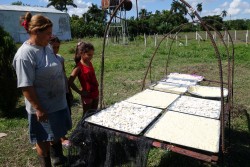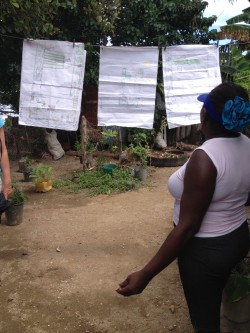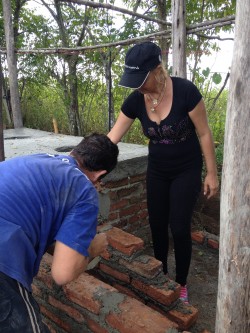Ending Machismo in Cuban Agriculture
By Justine Williams[1]
Women comprise 45% of the world’s agricultural force, but make up less than 20% of its land-holders, and receive only 5% of all agricultural extension services.[2],[3] Although they contribute significantly to the world’s food supply and the daily operations of many family farms, women’s agricultural work is regularly under-recognized and under-paid. Because they face discrimination in accessing resources, they often produce less than they are capable of. [4]
It is clear that agriculture and food production systems are overdue for a gender-based critique and overhaul. In response, agricultural development programs are increasingly considering the “problem” of women’s status in agriculture. Many projects are being implemented to train, organize, and empower them.
It is clear that agriculture and food production systems are overdue for a gender-based critique and overhaul.
However, several programs in Cuba are taking a different approach. To create gender-balanced agri-food systems, they place masculinity at the center of the critique, recognize the work that women already do in agriculture, and strive to take down machismo.[5] “Women aren’t the problem,” says Caridad Cruz of the Antonio Nuñéz Jiménez Foundation for Nature and Man (FANJ), implying that many are already “empowered” and skillful, “so we focus on the men too.”[6]
The Cuban Revolution brought new political status and legal rights to Cuban women beginning in the 1960s. Since the establishment of the socialist government, women surveyed by international and Cuban researchers report greater access to education, healthcare, childcare, and employment. However, within the home, many women continue to shoulder the major burden of domestic labor, and they also occupy a minority of political, administrative and leadership positions.[7]
The Cuban Revolution brought new political status and legal rights to Cuban women beginning in the 1960s
Organizations like the Federation of Cuban Women (FMC) have long sought to address these problems in society at large, and, now, a variety of agroecology, permaculture and local, sustainable food production projects are looking at gender issues through the lens of sustainable agriculture. Cuban women have historically contributed to agricultural production through an impressive variety of roles including cane cutting, row-crop farming, urban farm management and technical advising. However, most commonly, women in small-scale farming families attend to farm animals, assist in harvests, care for kitchen gardens, and prepare meals – sometimes several times a day for teams of farm laborers.

Margarita García and two of her daughters survey the progress of yucca they are drying to save for the year
Stay in the loop with Food First!
Get our independent analysis, research, and other publications you care about to your inbox for free!
Sign up today!Although these duties often take more time than men’s work, and are equally essential to the farm’s daily operation and income, women are not always considered equal partners in farm management or included in the membership of agriculture cooperatives.[8] To tackle this problem Cuban associations and institutes are enacting a variety of strategies. The Cuban Association of Agricultural and Forestry Technicians (ACTAF) and the Cuban Association for Animal Production (ACPA) have begun to present annual awards to women producers in order to acknowledge and raise public awareness of their work.
Other programs, including the Program for Local Agricultural Innovation (PIAL), are working in coffee production zones, where agricultural activity takes place away from home-sites, to create agroecology gardens where women with young children can work without having to find alternative childcare arrangements.

During an ecological construction workshop, a permaculturist learns to lay bricks and participates in constructing a dry (composting) toilet
PIAL and other organizations are also taking on the culture of gender and domestic relationships. FANJ, mentioned above, a non-governmental organizations that supports permaculture practices for local, sustainable development, includes discussions about gender in all of its workshops. At these events, which are attended by urban farm managers, campesinos, and home-gardeners, participants discuss the importance of sharing labor between partners and family members, and of equally valuing each other’s roles.
“Esteban,”[9] who runs a successful urban farm in central Cuba, and is married with two young children to the provincial administrator of urban agriculture, explains that after participating in these workshops, “You see things differently. For example, before, if I would clean the floor, I would tell my wife ‘I’m helping you.’ Now I see it isn’t just a favor, it’s for the well-being of the whole family. If I arrive home before her in the evening, I will start to cook. I used to just wait for her.” Re-balancing domestic labor is important not only to create a fair division of chores between a couple, but also because it leads to the higher societal valuation of this work, and frees up women’s time to focus on other pursuits.
FANJ’s network of growers believe that it is important to visit each other’s farms regularly, to attend conferences, and to travel to other parts of the country in order to exchange experiences and knowledge. Although many Cuban men still believe it is inappropriate or risky to a relationship for women to travel alone, both men and women in this community reject this idea as chauvinistic, and couples often alternate participation in events.

A woman who cultivates fruits, vegetables and herbs and raises animals in her backyard and rooftop presents her “system design” to visiting students.
Margarita García and Reinaldo Solenzal are farmers in Sancti Spíritus, Cuba. Eight years ago they began to learn about agroecology. They became promoters and sought out additional opportunities to learn about sustainable, local food production. Though Margarita had always been active in the farm’s operation and shared a mutually respectful relationship with “Rey,” participation in workshops with PIAL and the Cuban Council of Churches (which runs sustainable agriculture programs) encouraged the couple to think more critically about gender, and to share these reflections with the other farmers they exchange agroecological knowledge with.
“Gender equity does not have to be equality,” Margarita says “or mean that I have to do all the same work as my husband. It is respecting both roles and sharing decision-making.” In their case, Margarita has become the household expert on the production of “beneficial micro-organisms,” bacteria that agroecological farmers in Cuba are increasingly cultivating to use as a dual-action organic pesticide and fertilizer. When other farmers visit them, she leads the demonstration of this technique. She also cares for many of their farm animals and she and her oldest daughter have become experts in a variety of food-preservations techniques.
Cuban feminist leaders have long called on fellow women to be more assertive in demanding egalitarian relationships with their partners, and women like Margarita are now answering their calls. As she points out, ending machismo is up to both men and women. “If my husband comes home and says he will finish washing the dishes, but I say ‘oh no, this is my job,’ then I am just as guilty of machismo.”
Cuban feminist leaders have long called on fellow women to be more assertive in demanding egalitarian relationships with their partners
In 2014, Rey was invited to represent his province in a prestigious all-expense paid conference, but the invitation was not extended to his wife. Ironically, at this same conference, a researcher from the national ministry of agriculture lamented during her presentation that women only occupy 18.5% of decision-making positions in agricultural administration. Undoubtedly Cuban agriculturists still have a lot of work ahead of them in the struggle to achieve gender equity. However, programs like those run by FANJ, PIAL and the Council of Cuban Churches, which confront machismo and give value to women’s work, are taking important steps. They remind us that gender injustice in agricultural and food production is not based in inherent inequalities, but in cultural decisions about what work to value and recognize.
[1] Justine Williams holds an MA and is a PhD candidate in anthropology at the University of North Carolina in Chapel Hill. She lived and conducted research in Cuba during various periods between 2011 and 2015. She also serves as coordinator and co-editor for the Land Justice project at Food First.
[2] FAO. (2011). The State of Food and Agriculture: Women in Agriculture.
[3] FAO. (Undated). The Female Face of Farming. http://www.fao.org/gender/infographic/en/ Accessed February 1, 2016.
[4] Ibid.
[5] Machismo refers to a cultural concept of “manliness” that emphasizes difference between men and women and often leads to chauvinism and misogyny.
[6] Caridad Cruz. Personal Interview. June 2012.
[7] Safa, Helen I. (1995). The Myth Of The Male Breadwinner: Women And Industrialization In The Caribbean. Boulder: Westview Press.
[8] Essentially all Cuban farmers are members of one of three types of agricultural cooperatives. Cooperatives elect presidents, employ administrative staffs, and meet monthly to discuss production plans and resource allocation.
[9] This information was gathered as part of anthropological fieldwork in which all names and interviews were anonymized following ethnographic standards.


 Help Food First to continue growing an informed, transformative, and flourishing food movement.
Help Food First to continue growing an informed, transformative, and flourishing food movement.




